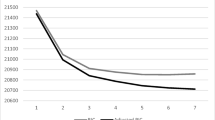Abstract
Although college students' epistemological orientation largely determines how they approach, interpret, and learn in higher educational contexts, little is known about the student characteristics which reliably predict the orientation. Thus, the aim of this study was to determine the relative potency of different student characteristics potentially salient to differentiating epistemological view. The student variables evaluated were demographic (major and sex), verbal ability, and learning style (four scales from the Inventory of Learning Processes). Results of correlational and multiple regression analyses reveal that only students verbal skill accounted for a significant percent of the variance in epistemological orientation. The results are discussed in terms of the meaning of the orientation, its relevance to practitioners, and implications for further investigation.
Similar content being viewed by others
References
Beers, S. (1985, March).An Analysis of the Interactions Between Students' Epistemological Assumptions and the Composing Process. Paper presented at the Annual Meeting of the Conference on College Composition and Communication, New York, NY.
Benack, S. (1982). The coding of dimensions of epistemological thought in young men and women.Moral Education Forum, 7, 3–23.
Brown, W.F., & Holtzman, W.H. (1967).Survey of Study Habits and Attitudes Manual. New York: The Psychological Corporation.
Clinchy, B., Lief, J., & Young, P. (1977). Epistemological and moral development in girls from a traditional and a progressive high school.Journal of Educational Behavior, 69, 337–343.
Copes, L. (1980).College Teaching Mathematics and the Perry Development Scheme. Unpublished paper, Institute for studies in educational mathematics. St. Paul, Minn.
French, J.F., Ekstrom, R., & Price, L. (1962). Manual.Kit of Referenced for Cognitive Factors. Educational Testing Service; Princeton, N.J..
Goldberger, N.R., Marwine, A., & Paskus, J. (1978).The Relationship between Intellectual Stage and the Behavior of College Freshmen in the Classroom. Unpublished manuscript, Simon's Rock of Bard College, Great Barrington, MA.
Goldsmith, S. (1977). Application of the Perry scheme in a college course on human identity.Pupil Personnel Services Journal, 6, 185–196.
Jensen, A. (1980).Bias in Mental Testing. New York: Free Press.
Kelton, J., Griffith, J.V. (1985).The Learning Context Questionnaire for Assessing Intellectual Development. Paper presented at the Project Match Invitational Conference. Davidson, NC.
Kerlinger, F.N. (1986).Foundations of Behavioral Research. New York: Holt, Rinehart, & Winston.
Kimmel, D.L. (1985, June).Use of the Perry Model in an Introductory Biology Course. Paper presented at the Project Match Invitational Conference, Davidson, NC.
Knefelkamp, L.L., & Sleptiza, R. (1976). A cognitive-developmental model of career development: An adaptation of the Perry scheme.The Counseling Psychologist, 6, 53–58.
Mentkowski, M., & Doherty, A. (1984). Abilities that last a lifetime: Outcomes of the Alverno Experience.AAHE Bulletin, 6, 5–14.
Moore, W.S. (1984).A Preliminary Study of Cognitive Stage/Style Interactions: The Perry Scheme and the Myers-Briggs Type Indicator. Center for the Study of Intellectual Development, Athens, GA. (ERIC Document Reproduction Service No. ED 253 792).
Perry, W.G. Jr. (1968).Patterns of Development in Thought and Values of Students in a Liberal Arts College: A Validation of a Scheme. Cambridge, MA: Harvard University. (ERIC Document Reproduction Service No. ED 024 315).
Perry, W.G. Jr. (1970).Forms of Intellectual and Ethical Development in the College Years: A Scheme. New York: Holt, Rinehart, & Winston.
Perry, W.G. Jr. (1981). Cognitive and ethical growth: The making of meaning. In A.W. Chickering (Ed.),The Modern American College (pp. 76–116). San Francisco: Jossey-Boss.
Ryan, M.P. (1984a). Monitoring text comprehension: Individual differences in epistemological standards.Journal of Educational Psychology, 76, 248–258.
Ryan, M.P. (1984b). Conceptions of prose coherence: Individual differences in epistemological standards.Journal of Educational Psychology, 76, 1226–1238.
SAS.SAS/STAT Guide. Version 6. SAS Institute Inc. Box 8000, Gary, North Carolina.
Schmeck, R.R. (1983). Learning styles of college students. In R. Dillon & R.R. Schmeck (Eds.),Individual Differences in Cognition (vol. 1). New York: Academic Press.
Schwartz, N.H., & Wilkinson, W. (1988). The relationship between epistemological orientation and cognitive abilities.Educational and Psychological Research, 8, 129–139.
Sleptiza, R. (1983).Commitment within the Perry Scheme: A Question of Structural Change. Unpublished doctoral dissertation, University of Maryland.
Stephenson, B.W., Hunt, C. (1977). Intellectual and ethical development: A dualistic curriculum intervention for college students.The Counseling Psychologist, 6, 39–42.
Widick, C., Simpson, D. (1978). Developmental concepts in college instruction. In C.A. Parker (Ed.),Encouraging Development in College Students (pp. 27–59). Minneapolis: University of Minnesota.
Wilkinson, W., Schwartz, N.H. (1987). The knowledge orientation of a group of gifted adolescents: An empirical test of Perry's model.Psychological Reports, 61, 976–978.
Wilkinson, W., & Schwartz, N.H. (1989).A Factor Analytic Study of Epistemological Orientation and Related Constructs. Manuscript submitted for submission.
Wilkinson, W. (1989). [The relationship between epistemological orientation and cognitive processing]. Unpublished raw data.
Author information
Authors and Affiliations
Rights and permissions
About this article
Cite this article
Wilkinson, W.K., Schwartz, N.H. Predicting students' epistemological orientation from demographic, ability, and learning style variables. Innov High Educ 14, 131–139 (1990). https://doi.org/10.1007/BF00889614
Issue Date:
DOI: https://doi.org/10.1007/BF00889614




